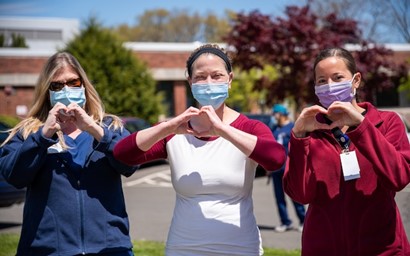
The COVID-19 pandemic led to a renewed appreciation for first responders, as Americans gathered on their front stoops every evening in the early coronavirus days to cheer for the heroes who were keeping our families safe – sometimes even to the detriment of their own.
Among those deserving of celebration were nurses. In fact, nurses have long been the backbone of many medical organizations, even though the less informed may look down on nurses in comparison with doctors, surgeons, or others with more “advanced” degrees. The International College of Health Sciences elaborates more below on why nurses are the heart of healthcare.
Nurses are an Integral Part of the Healthcare System
Nurses make up an enormous portion of our healthcare system. The International Council of Nurses notes that they account for nearly 50% of the healthcare workforce worldwide and provide almost 80% of all hands-on care. Without this integral delivery of support, the healthcare system would come to a screeching halt. While doctors in hospitals may spend mere minutes with a patient, it is the nurses who are there constantly monitoring the sick, sharing information, and seeing care through from beginning to end.
Most doctors specialize, but nurses tend to be jacks and jills of all trades, able to be all things to all people and able to shift gears on the fly. They advocate for patients, provide education, administer beside care, battle disease through cleanliness and disinfectant regimens, assist in surgeries, administer medicine, and may even diagnose an ailment based on their in-depth observations, all while providing mental and emotional support with a calm, friendly demeanor. They are often the first person a patient sees when they enter a healthcare facility, and the last they see when they leave; therefore, nurses can truly set the tone for the entire care process.
Providing Support to Patients and Families
Nurses provide mental and emotional support not only to patients, but also to their families. Often, families form a bond with the nurses who are caring for their sick or injured loved on and come to rely on the nurses to relay the bulk of critical information, updates, and education on the ailment and treatment. Especially in a hospital setting, it’s important to have a human connection during what can feel like an isolating and scary situation. That connection comes from the nursing staff.

Nurses Help in the Home
When it’s time for patients to transition from care in a hospital or office to at-home care, nurses are also right there leading the charge. This can potentially be a fraught and more serious situation, a result of a need for long-term recovery or even hospice / end-of-life care, all taking place in one’s own place of residence which, while more comfortable, may not be properly equipped to provide the ideal environment for healing and rest. Nurses are a phenomenal resource who can train family members or at-home caregivers on proper techniques and treatments and advise on home set up and equipment. Some nurses will even visit the patient to provide treatment at home.
In Conclusion
At the core of healthcare, nurses are the compassionate pillars who offer vital emotional support, skilled care, educational guidance, and fierce advocacy, extending their unwavering dedication from clinical settings to the very heart of homes.



